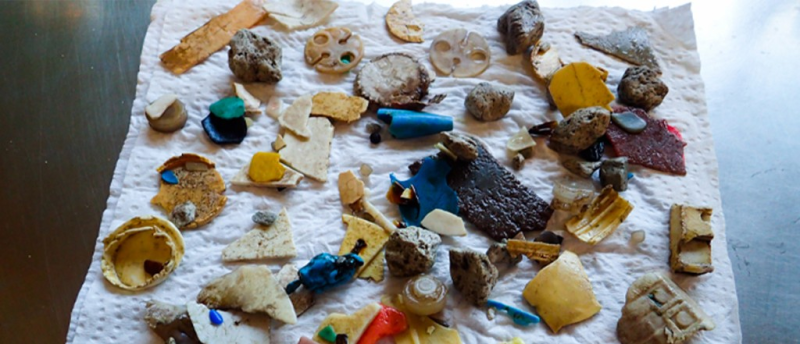Seabirds' cholesterol levels raised through plastic ingestion

A new study of seabirds that had ingested plastic debris has revealed the range of impacts on their health and physiology including a rise in cholesterol levels.
The research was undertaken by an international team of scientists including Dr. Alex Bond, the Senior Curator of Birds at the Natural History Museum.
This work, part of a longer-term study being carried out on Lord Howe Island 600 kilometres off the eastern coast of Australia, has revealed that this remote island is home to some of the most plastic contaminated birds in the world.
Dr. Bond has been studying this population of flesh-footed shearwaters for almost a decade.
"Most of the work looking at the effects of ocean plastic on wildlife involves mortality. The seabirds we encountered alive also had plastic in them, and we wanted to understand what effects that plastic ingestion might be having."
The team discovered that rather than feeding their chicks the usual diet of fish, adult birds have been providing their young with shards of plastic, including bottle tops and biro lids. Previous findings have revealed that between 80 to 90 percent of all chicks studied had at least one piece of plastic in their stomach. In one extreme case 274 pieces, weighing 64 grams, were found in a single bird.
The new study was led by The Institute for Marine and Antarctic Studies' Dr. Jennifer Lavers.
Dr. Lavers said: "Flesh-footed shearwater populations are declining across the south west Pacific Ocean and Western Australia's south coast. Plastic ingestion has been implicated in this decline but the mechanisms by which it affects shearwaters are poorly understood."
Analysis found that the plastic ingestion recorded in these birds can have a significant negative impact even on superficially healthy seabirds.
Dr. Bond explained the findings: ' "What was interesting was that for certain blood chemistry values we did find some significant effects. For example, birds with plastic had higher cholesterol, they had lower dissolved calcium and they also tended to have more uric acid and more amylase in their blood. Just a single piece of plastic is enough to cause this change."
The rise of cholesterol levels was an unexpected finding and what this means for the birds and their health is still not fully understood. In humans, high cholesterol can cause circulatory problems and research is yet to be carried out to understand how such changes affect birds.
At this stage the team are unsure how exactly the presence of plastic is causing these changes in the shearwater chicks. It could be that the plastic itself is somehow directly impacting the birds but it could also be the bacteria accumulated on the surface of the these plastics as they float around the oceans. It is clear further research will be needed to aid in the protection of this declining species.
Flesh-footed shearwaters are currently considered "Near Threatened' and over the last three generations Bird Life International estimates that their populations have declined by up to 29 percent.
One of the major concerns for the species is their accidental by catch in the fishing industry, nest predation by invasive rodents and development of coastal sites. The addition of plastics could potentially increase their decline.
Dr. Bond concludes: "You have to wonder how long this species can keep this up.
Plastic that is already in the ocean floats around for decades, and we've now had 70 years of industrial-level plastic production, so a lot of it is already in the world's oceans. Reducing the amount of plastic that gets into the ocean is the only way that it is going to be sorted."
The research is published in the journal Environmental Science & Technology.
More information: Jennifer L. Lavers et al. Clinical Pathology of Plastic Ingestion in Marine Birds and Relationships with Blood Chemistry, Environmental Science & Technology (2019). DOI: 10.1021/acs.est.9b02098
Journal information: Environmental Science & Technology
Provided by Natural History Museum





















